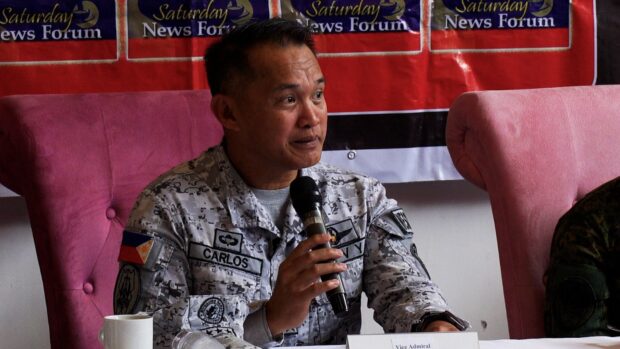Ex-Wescom Chief: I didn’t give consent to Chinese embassy’s recording

File photo of Vice Admiral Alberto Carlos
MANILA, Philippines — Embattled Vice Admiral Alberto Carlos, the former chief of the military’s Western Command, said he did not consent to being recorded, an action that violates the country’s anti-wiretapping law.
“I have not given my consent to record to anybody, and I have not been asked for permission,” Carlos said during the hearing of the Senate Committee on National Defense and Security, Peace, Unification and Reconciliation.
The Republic Act No. 4200 prohibits the recording of any private conversation without the consent of all parties.
The Chinese embassy presented a supposed transcript of the conversation between Carlos and a Chinese diplomat.

It also claimed that it has an audio recording of the exchange pertaining to the “new model” of Ayungin Shoal, according to a Manila Times report.
Carlos was removed as chief of Wescom after this issue came out.
The Department of Justice (DOJ) affirmed that the Chinese Embassy, which leaked a supposed transcript of the conversation, has violated the laws of the country.
“It could be considered as a violation of the wiretapping law,” said Atty. Fretti Ganchoon, Senior State Counsel of the DOJ.
Claims are taken with a grain of salt
Carlos confirmed that the conversation in the audio recording took place.
But he denied that it has something to do with the “new model” and “common understanding” in the Ayungin (Second Thomas) Shoal as purported by the Chinese authorities.
The regular resupply mission in the BRP Sierra Madre, grounded in Ayungin Shoal, became one of the flashpoints of tension in the West Philippine Sea.
Chinese vessels resorted to the use of military-grade lasers and water cannons against Filipino vessels. These assaults have injured Philippine Navy personnel.
The DOJ official said it takes with a grain of salt the Chinese embassy’s claim.
“This is the first time that we are hearing the sworn testimony of Vice Admiral Carlos because we are not also sure before of the truthfulness, the authenticity of the transcript,” Ganchoon said.
“But we have a testimony now that we can use that, indeed, there was a call and it was recorded,” she said.
“Anything that comes from our friend, from our neighbor, we treat it very carefully because we are in the middle of the fight for the West Philippine Sea,” she noted.
“So, anything that comes from them, we treat them very carefully,” she added.